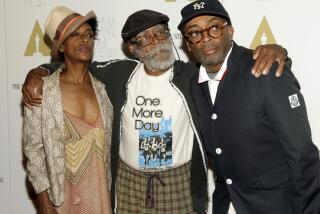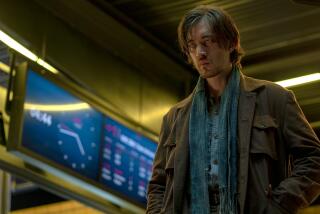Keye Luke Dies; Was ‘No. 1 Son’ of Charlie Chan
Keye Luke, the perpetual Asian-American sidekick in dozens of films over six decades, who will be forever in the public eye as Charlie Chan’s “No. 1 Son” in that classic mystery series, has died in a hospital near his Whittier home.
Luke was 86 when he died Saturday of a stroke, said his longtime agent and friend, Guy Lee.
Luke was born in Canton but raised in Seattle, where he studied at the University of Washington. His career ran a gamut from the bewildered but pleasantly courteous son in 13 of the 46 Chan films to the blind, omniscient Buddhist monk who was David Carradine’s mentor in the “Kung Fu” TV series.
It began in a distant era when Hollywood gossip columnists were as powerful as Hollywood studio owners and Luke managed to attract the favorable attention of both Louella Parsons and Hedda Hopper.
They learned of him after he had been promised a role opposite Anna May Wong in a sequel to the musical “Flying Down to Rio.” The picture was never made but the columnists heard of Luke’s failed opportunity and publicized it.
He had begun at the studios as a commercial artist (his paintings, portraits and drawings were exhibited often over the years) and made his film debut in the 1934 Greta Garbo vehicle, “The Painted Veil.”
“I was extremely lucky,” he told The Times in 1986. “I started at the top.”
And he stayed there for nearly 150 parts, ranging from the “Dr. Kildare” series to the Green Hornet’s fighting servant, Kato, to “Oil for the Lamps of China” to “Love Is a Many Splendored Thing.”
His roles involved such kindly older men as the curio shopkeeper in the “Gremlins” films and the beloved father in the New York company of “Flower Drum Song.”
Currently he can be seen as the Chinese herbalist in the Woody Allen picture “Alice.”
Luke said he left the Chan series after the 1938 death of Warner Oland, “the only Charlie Chan.”
While many have criticized the casting of Oland--a Swede portraying an Asian sleuth--Luke defended both Oland and his own portrayal of the passive son.
“He gave a faithful portrayal of a Chinese Mandarin scholar” and studied both Chinese culture and Chinese dialogue, Luke said in 1986.
Luke considered the Chan films harmless entertainment compared to more recent pictures like “Year of the Dragon,” which he said were demeaning and depicted Asian-Americans as mean-spirited.
“How can it (the Chan character) be demeaning . . . when the character was the hero? People respected him, police departments consulted with him.”
But his favorite role was as Master Po, the monk of the Shaolin Temple in “Kung Fu.”
“He was the example of the Buddhist Zen sect, which I think is the best development in that physical thought of China. And given those sayings out of old ancient Chinese philosophy from Confucius, from Mencius, and actually saying them in English for a world audience. . . .
“Where do you get an opportunity like that?”
Luke is survived by his daughter, Ethel, with whom he lived.
In lieu of flowers, donations are asked to the Assn. of Asian Pacific American Artists, 3518 Cahuenga Blvd. West, Suite 302, Los Angeles 90068.
More to Read
Only good movies
Get the Indie Focus newsletter, Mark Olsen's weekly guide to the world of cinema.
You may occasionally receive promotional content from the Los Angeles Times.










